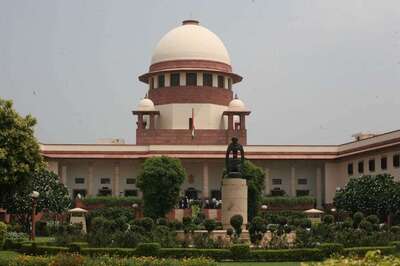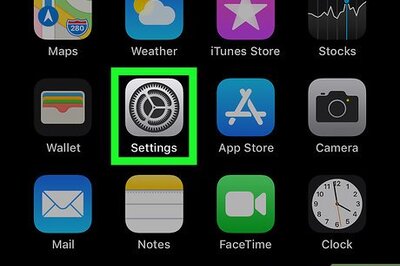
views
New Delhi: Facing a possible auction of his personal and company assets by Securities and Exchange Board of India (Sebi), a defiant Sahara chief Subrata Roy says he feels victimised by a chain-reaction of events over the years that began with a political vendetta in 2005, followed by regulatory clampdowns by RBI and Sebi.
"It started as a political vendetta against us in 2005, and thereafter it became a chain reaction. First RBI took actions against us in 2008 and thereafter Sebi clamped down on our businesses," said head of diversified conglomerate Sahara group that has presence in entertainment, real estate, financial services and hospitality businesses, among others.
Speaking to PTI over telephone, Roy said that the other businesses of Sahara group were getting affected because of Sebi's actions, but he was ready for a "fight to finish" and confident of the matters being resolved in due course.
Roy was summoned by the market regulator Sebi on Wednesday to ascertain details of his personal and two company assets that could be sold to generate over Rs 24,000-crore worth funds required to be returned to the investors.
Sebi has charged Sahara India Real Estate Corp Ltd (SIRECL) and Sahara Housing Investment Corp Ltd (SHICL) of "various illegalities" in raising these funds.
The Supreme Court has asked Saharas to return this money to over three crore bondholders, while Sebi has been asked to facilitate the refund after verifying genuineness of the investors.
A combative Roy claimed that his group has been target of personal vendetta by "certain" officials from RBI and Sebi. Sahara chief further said that 60 per cent of his time has been wasted in fighting Sebi in last two years, which could have been otherwise utilised for "some constructive work".
"We have suffered a lot because of this," he said. Asked whether he felt victimised, Roy said: "Definitely, we are. We have been the target of Sebi for no reasons."
He, however, ruled out any political conspiracy at play in the current scenario and said that the politics was at play in problems created for his group way back in 2005.
"Today, the issues being raised against us do not appear to be linked to the original political matters of 2005," he said, but refused to specify what those issues were, saying it was an old matter and should not be raised at this time.
Roy has often been described as being close to various political leaders, especially those from Uttar Pradesh. He also denied the allegations of his group companies being used to launder the funds of rich politicians and others and dared the "entire system" to prove even one case of fictitious investor accounts or money laundering.
After appearing before Sebi on Wednesday afternoon, Roy told the waiting reporters that his personal assets were worth only about Rs 3 crore and he had no immovable properties.
Roy, who generally keeps away from direct media glare and has been lately communicating his and group's views through full-page newspaper advertisements, surprisingly talked at length to the mediapersons, who had gathered in large numbers outside the Sebi headquarters in Mumbai.
Striking a defiant pose, Roy accused Sebi of delaying the refund by not distributing the money deposited with it.
Sahara group claims that it has returned bulk of the investors directly and its total outstanding liability was much less than Rs 5,120 crore it has already deposited with Sebi, but these claims have been questioned by the regulator.
"My point is that we only gave the figure of Rs 24,700 crore for the funds raised by Sahara companies and we gave these figures on our own. If they believed us on that figure, why are they not believing us when we say that we have repaid most of the investors and the total outstanding is much less than Rs 5,120 crore deposited with Sebi for the refund," he said.
"If we are proven wrong, we should be hanged, but the same should apply to others as well. If others are found to be wrong in this matter, they should also be hanged," he said.
When asked whether he expected regulatory actions against Sahara group's retail venture Q-Shop as well, Roy said: "Not at all, Q-Shop is a purely non-financial business and it should not face any problems."
Admitting that other businesses were getting affected due to tussle with Sebi, Roy said: "We will fight it till we take it to the logical conclusion and I would not give up. "People tell me that why I'm fighting always, but I have no other option. I will fight till my last breath. We have grown this business like a family. There are 10 lakh people and they are my family."
Clamping down on Sahara's residual non-banking operations in 2008, RBI had asked it to stop collecting deposits under this business and return the money already garnered. This was followed by Sebi's actions in 2010 against money raised by two Sahara firms through bonds known as OFCDs (Optionally Fully Convertible Debentures).
After the Sahara firms failed to deposit the entire amount of over Rs 24,000 crore collected through OFCDs, Sebi has gone ahead with attachment orders of bank accounts and assets.
"As per the law, Sebi can not sell any assets. They do not have the powers. The court relates to attachment of assets of only two companies, and that too through a proper judiciary mechanism, and not the assets of mine and others," he said.
Asked about the allegations of money laundering, fictitious investors and handling the money of politicians, Roy said: "People say these things, but I challenge the entire system to look into the matter and prove even one single fictitious account or any single paisa of money laundering."
Roy maintained that he was hopeful that the matters would be "resolved for good". "I am a strong believer in truth and truth can be troubled and suppressed, but it can not be defeated," he added.




















Comments
0 comment